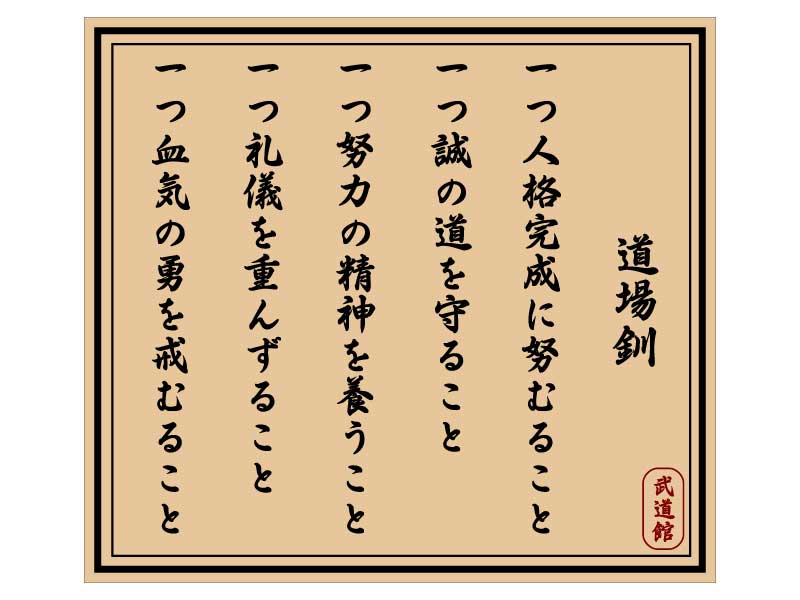Dojokun is a set of five principles that guide students in their karate practice. These principles were established by Gichin Funakoshi, the founder of modern karate. This is the Dojokun:
- Seeking perfection of character – “Hitotsu! Jinkaku kansei ni tsutomuru koto!”
This is the most important principle. The aim of karate is to develop a strong, honest character. Discipline and constant training help to strengthen character, build self-confidence and develop perseverance. - Being faithful – “Hitotsu! Makoto no michi o mamoru koto!”
It’s a reminder to always be honest and truthful with yourself and others. - Show effort – “Hitotsu! Doryoku no seishin o yashinau koto!”
This means that the karateka must constantly strive to improve. This includes improving technique, fitness, understanding of karate and personal development. - Respect others – “Hitotsu! Reigi o omonzuru koto!”
Respect is a fundamental value of karate. It’s about respecting other karatekas, teachers, dojo rules and even opponents. - Refrain from violent behavior – “Hitotsu! Kekki no yu o imashimuru koto!”
This means that karateka must not use their skills improperly or to cause harm to others. Karate is a practice of self-defense, not an excuse for violence.
These five principles are meant to be respected both in the dojo and in everyday life. They help guide karateka in their practice and personal development.
Dojo etiquette is a set of rules and behaviors that govern the conduct and attitude of karate practitioners. Compliance with this etiquette is essential to maintain discipline and harmony within the dojo. Here are the essential principles of dojokun:
1. Respect for others
Respect for others is a fundamental value in karate and manifests itself in many ways in a dojo. This includes respect for instructors and other students, regardless of rank or level of experience. It also means treating everyone with courtesy and respect, bowing when entering and leaving the dojo, and listening attentively when someone is speaking.
2. Respect for the site
The dojo is a sacred place for learning and practicing karate. It must be treated with the utmost respect. This means keeping the dojo clean and tidy, not eating, drinking or smoking in the dojo, and not using foul or inappropriate language. Silence is generally the rule when a teacher is speaking or demonstrating a technique.
3. Discipline and obedience
Discipline is essential to the practice of karate and must be maintained in the dojo. Students must follow the teacher’s instructions without hesitation and obey the rules and rituals of the dojo. This can include such things as lining up according to rank or position, responding appropriately to the teacher and maintaining a serious, focused attitude during training.
4. Humility
Humility is another important karate value that must be respected in the dojo. This means not being boastful or superior, acknowledging your own mistakes and limitations, and being open to learning and constructive criticism.
5. Integrity
Integrity is another important aspect of dojo etiquette. This means being true to ourselves and to others, and acting ethically and honorably in all circumstances. It’s not just a question of respecting the rules of the dojo, but also of acting with honesty and integrity outside the dojo.
These rules and behaviors are not simply intended to maintain order and discipline in the dojo, but aim to cultivate a state of mind and character that are essential to the practice of karate. By respecting dojo etiquette, karate practitioners can develop values and attitudes that will help them not only in their karate practice, but also in their daily lives.


